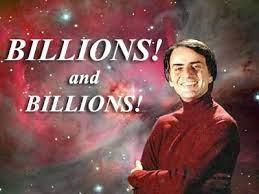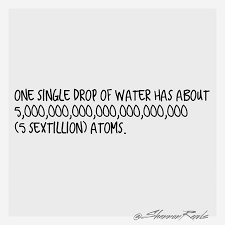No, this is not about government spending. It’s galaxies.
PBS’s “Nova” science series recently had a program about the universe, with casual mention of trillions of galaxies. I was like, “Wait, what?” Trillions?

Carl Sagan never actually said “Billions and billions,” the phrase associated with him. Anyhow, I had long understood that our Milky Way Galaxy has around 100 billion stars; more recently bumped up to 200 billion. Now the same Nova program says 400 billion. I don’t know where those additional 200 billion came from. Not exactly a rounding error.
I had also been under the impression that galaxies number something like a hundred billion. All these numbers in the billions I could get my head around — sort of.

The oft-invoked reference point is grains of sand. Of course, a star is rather bigger than a sand grain. And if there are, say, a hundred billion galaxies, averaging a hundred billion stars each, that would be ten thousand billion billion, or ten trillion billion, or ten sextillion stars. And that’s way more than all the sand grains on earth.
But — if galaxies number not in the billions but trillions — that finally blows fuses in my brain. That would mean stars in the septillions. Numbers beyond sextillion I cannot register. And, indeed, Nova’s mention of trillions of galaxies does seem to be the current scientific thinking.

Googling about this also revealed that — forget sand grains — the number of stars in the universe is also roughly comparable to the number of molecules in ten drops of water. Which tells us that molecules are really really really small.
And by the way, the universe is 13.8 billion years old, which might seem a big number too. But apparently it’s actually still in its infancy, its lifespan is reckoned to be at least 100 billion years. Maybe a trillion.
But if the universe’s size, and these time scales, seem ultra-humongous, and the size of molecules ultra-small, that’s only from the perspective of our own size and lifespans. There is no universal standard of reference that says the universe is “large” or molecules “small.” In fact, those are meaningless statements. The cosmos just is what it is.

Though it is hard to envision getting trillions of galaxies out of a Big Bang that started smaller than a molecule. But I find it harder still to imagine that galactic vastness was created by some sort of pre-existing intelligent entity (never mind the question of where she came from). Seems like too much work even for an “omnipotent” god.
